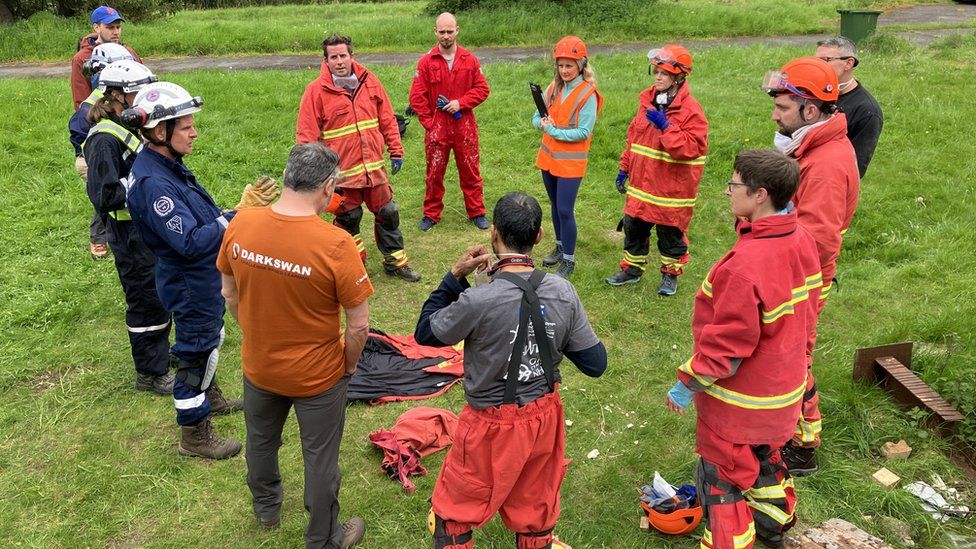
A three-day event involving handling mock emergency situations makes up part of the course
Ex-SAS soldiers form part of an NHS training scheme aimed at preparing staff for challenges they will face.
Born of a perceived lack of preparation for Covid, the 10-month Climb programme includes training for unexpected emergencies and hostile environments.
As the NHS turns 75, bosses said it could survive if “overwhelming” problems were overcome.
Dr Jonathon Gray of Cardiff and Vale health board said new challenges needed “different forms of leadership”.
Despite pulling together to open the Dragon’s Heart field hospital in the Principality Stadium during the pandemic, those in charge realised their team members were unprepared to deal with the situation.
The Climb programme culminates in a three-day event with tasks such as co-ordinating a full-scale emergency operation, rescuing bodies from collapsed buildings and dealing with unexpected emergencies.
Participants are guided through this by members of an international rescue team and former SAS soldiers.
Dr Gray, the health board’s director of improvement and innovation said the challenges facing NHS staff were “ever more complex”.
He added: “When could possibly be better than the 75th anniversary of the NHS to be investing and growing the young leaders who will create the future NHS?”
Dr Nikki Sommers says “doing our hardest but still not delivering the best care we’d like” is really hard for NHS staff
Nikki Sommers started her first shift as an A&E consultant at Ysbyty Gwynedd in Bangor, Gwynedd, at the start of the first lockdown in 2020.
Despite the unprecedented experiences of that time, Dr Sommers said emergency departments were faced with even bigger challenges today.
“People’s expectations and needs have gone up and we have an ageing population and a system that is totally overwhelmed,” she said.
“We’re holding ambulances outside now when we never really used to do that. We’re treating patients in corridors and that’s really distressing for staff and patients.”
Dr Sommers said being part of the programme helped her to assess her priorities and values.
She said it made her realise that she always wants to work in the NHS because of the importance of delivering free healthcare at the point where it was most needed.
Sara Edwards says issues facing the NHS have “worsened”
Dr Gray added: “During the pandemic we all faced a huge challenge as everybody knows. We were particularly inspired by the young leaders who ran towards the fire.
“But we all agreed we’d never really trained those young leaders, or given [them] what they needed to work really well together.”
Sara Edwards, an endoscopy service delivery manager at Hywel Dda health board, was part of the team that built the field hospital.
“We were a team of people who hadn’t worked together before but we were pulled together at short notice to deal with a situation we hadn’t been faced with before,” she said.
“The NHS had challenges before Covid but they have now worsened to some extent. There’s never enough money and we’re in a position now where there just aren’t enough members of staff trained to care for patients.
“We really have to think about how we can do things differently and do things better.”
Dr Sherard Lemaitre believes in a future for the NHS if it adapts
Dr Sherard Lemaitre, a GP in Cardiff, added: “I think the NHS does have a future and we all think we’re fortunate to have the health service.
“We need to think about how we can embrace the digital revolution and make sure we don’t leave people behind.”








